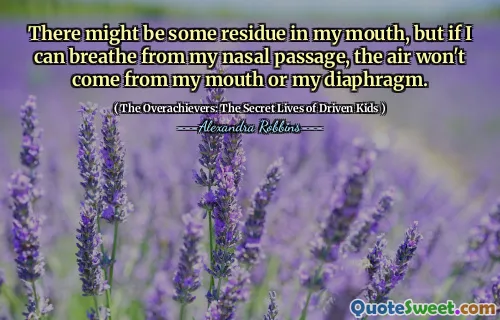
There might be some residue in my mouth, but if I can breathe from my nasal passage, the air won't come from my mouth or my diaphragm.
This quote underscores a nuanced understanding of breathing, emphasizing the importance of proper airflow and body awareness. At first glance, the mention of residual mouth contents may seem trivial, yet it carries a deeper significance about the mechanics and consciousness of breathing. Breathing through the nasal passages is often associated with health benefits such as filtering the air, humidifying, and regulating temperature, all of which contribute to better respiratory efficiency. Being able to breathe predominantly through the nose suggests a level of mastery over one's breath, which is often linked to mindfulness, meditation, and athletic performance. It highlights the importance of body awareness—being conscious of how and where we draw air into our bodies—and suggests that internal control over one's breath can influence how we feel, respond, and function. In a symbolic sense, the quote may also represent the discipline required to manage internal states amidst external clutter or distractions, like the residual content in the mouth. The reference to avoiding the use of the mouth or the diaphragm could indicate a striving for purity or perfection in breath control, aligning with practices such as yoga or breathing exercises that promote calmness and focus. Moreover, it subtly touches on the notion of presence—being aware of internal processes even when the environment or internal residue is less than ideal. Ultimately, this reflection inspires a mindful approach to physical and mental health, suggesting that mastering fundamental skills like breathing can lead to greater well-being and a heightened sense of control over one's body and mind.






